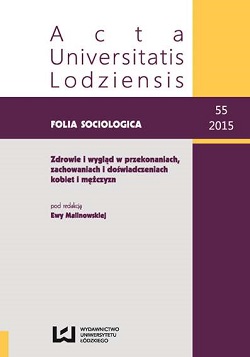Inequalities in health in light of the results of project “The problem of attendance of women to cytological tests in Poland. A sociomedical analysis”
DOI:
https://doi.org/10.18778/0208-600X.55.09Keywords:
social inequalities, gynaecological prophylaxis, medical sociologyAbstract
Low attendance of women to free cytology tests under the “Population Program of Prevention and Early Detection of Cervical Cancer” (PPPWWRSM) is an issue that requires an in-depth analysis. The presented project is one of the first representative sociological inquiries concerning this subject. The main goal of the project was to describe and interpret the attitude of women towards preventive smear tests and the diagnosis of the reasons for avoidance/postponement in time of such tests. Because of the complexity of the object of research two kinds of analysis were employed: qualitative and quantitative. 80 free interviews were conducted, the conclusions having been used at the stage of preparing the instrument for quantitative research. Personal interviews (CAPI) were conducted in the autumn of 2014 on the nationwide representative sample of 500 women aged 25–59 years (the population covered by the PPPWWRSM). The result of research is the knowledge about the health behaviors of Polish women and their social determinants. Especially worth noting are different behavior patterns resulting from social-cultural diversity (inter alia age, place of residence, education), which manifest themselves in the use of gynecological care, knowledge about prevention and its sources, and in motivation for undertaking pro-health activities.
References
Cockerham W. C. (2004), Medical Sociology, 9th ed., Pearson, Upper Saddle River.
Google Scholar
Daykin N., Naidoo J. (2005), Feminist Critiques of Health Promotion, [w:] R. Bunton, S. Nettleton, Burrows R. (eds.), The Sociology of Health Promotion. Critical Analyses of Consumption, Lifestyle and Risk, Routledge, London–New York–Paris.
Google Scholar
Estes C. L., Linkins K. W. (2000), Critical Perspective in Health and Aging, [w:] G. L. Albrecht, R. Fitzpatrick, S. C. Scrimshaw (eds.), The Handbook of Social Sciences and Medicine, Sage Publications, London.
Google Scholar
Kempińska-Mirosławska B. (2012), Szczepionka na raka szyjki macicy – skuteczna profilaktyka czy płonne nadzieje na fali medialnego szumu?, [w:] M. Gałuszka, M. Wieczorkowska (red.), Społeczne, kulturowe i polityczne uwarunkowania ryzyka zdrowotnego, Wydawnictwo Uniwersytetu Medycznego w Łodzi, Łódź, s. 211–237.
Google Scholar
Mumford E. (1983), Medical Sociology. Patients, Providers and Policies, Random House, New York.
Google Scholar
Nettleton S. (2009), The Sociology of Health and Illness, 2nd ed., Polity Press, Cambridge.
Google Scholar
Ostrowska A. (2011), Profilaktyka zdrowotna: interpretacje, definicje sytuacji, racjonalności (przypadek profilaktyki ginekologicznej kobiet), „Studia Socjologiczne”, nr 3 (202), s. 73–94.
Google Scholar
Sowa A. (2011), Społeczne uwarunkowania stanu zdrowia w Polsce, „Zdrowie Publiczne i Zarządzanie”, T. IX, nr 2, s. 28–37.
Google Scholar
Spaczyński M., Nowak-Markwitz E., Januszek-Michalecka L., Karowicz-Bilińska A. (2009), Profil socjalny kobiet i ich udział w Programie Profilaktyki i Wczesnego Wykrywania Raka Szyjki Macicy w Polsce, „Ginekologia Polska”, nr 80, s. 833–838.
Google Scholar
Synowiec-Piłat M. (2012a), Kampanie społeczne na rzecz pacjentów onkologicznych i ich najbliższych. Główne obszary działania, [w:] M. Synowiec-Piła t, A. Olchowska-Kotala (red.), Socjologia i psychologia dla pacjenta – wybrane zagadnienia, Wydawnictwo Adam Marszałek, Toruń, s. 66–83.
Google Scholar
Synowiec-Piłat M. (2012b), Realizacja idei upodmiotowienia na rzecz zdrowia w kampaniach społecznych dotyczących problematyki onkologicznej, [w:] M. Synowiec-Piłat, A. Olchowska-Kotala (red.), Socjologia i psychologia dla pacjenta – wybrane zagadnienia, Wydawnictwo Adam Marszałek, Toruń, s. 84–105.
Google Scholar
Downloads
Published
How to Cite
Issue
Section
License
Copyright (c) 2015 © Copyright by Włodzimierz Piątkowski, Anna Sadowska, Marcin Stanisław Bobiński, Wiesława Bednarek, Łódź 2015; © Copyright for this edition by Uniwersytet Łódzki, Łódź 2015

This work is licensed under a Creative Commons Attribution-NonCommercial-NoDerivatives 4.0 International License.










